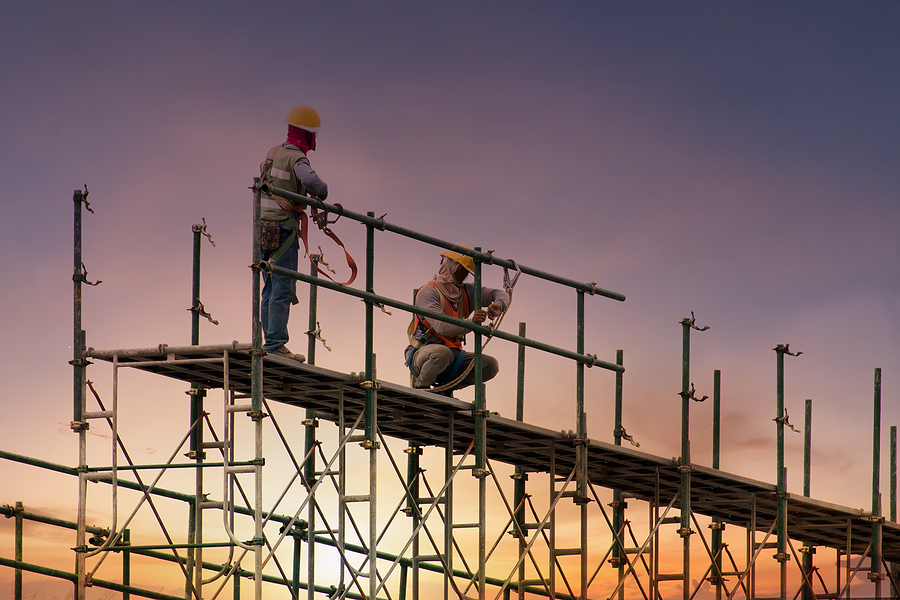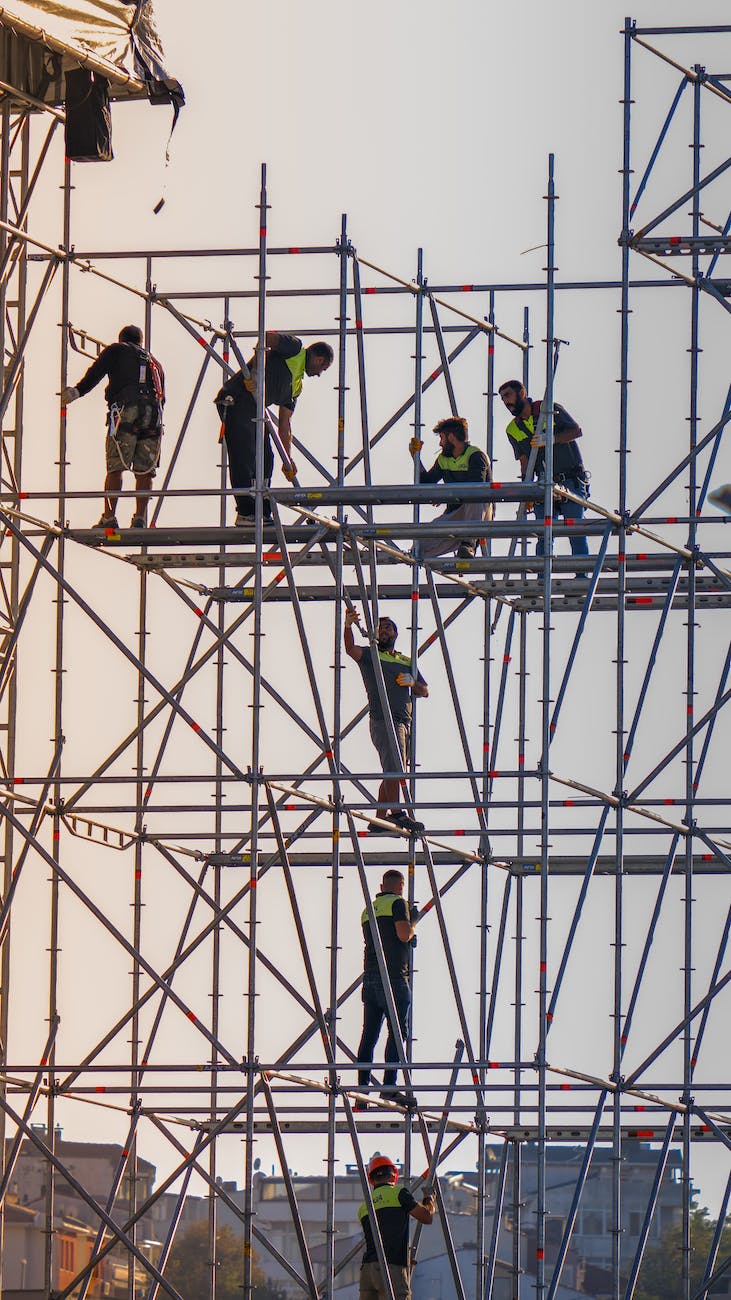Local Scaffolding Company Providing Reliable Services Throughout Surrey
Local Scaffolding Company Providing Reliable Services Throughout Surrey
Blog Article
Discovering the Different Kinds of Scaffolding Made Use Of in Construction Projects
The construction market relies heavily on various kinds of scaffolding to meet specific project demands, each offering unique benefits and applications. Standard frame scaffolding provides a strong structure for general tasks, while suspended scaffolding is crucial for service skyscraper frameworks. Various other choices, such as system and rolling scaffolding, accommodate efficiency and movement, respectively. Furthermore, the cantilever variant confirms very useful in city atmospheres where area is constrained. Understanding the subtleties of these scaffolding kinds is important for optimizing safety and efficiency on building sites, motivating a better examination of their unique characteristics and applications.

Typical Framework Scaffolding
Traditional frame scaffolding is one of the most commonly used techniques in the building and construction sector as a result of its effectiveness and versatility. This system contains horizontal and upright structures that are constructed to develop a secure system for materials and workers. The main components consist of upright articles, horizontal ledgers, and angled dental braces, which with each other give a strong structure that can support significant tons.
Among the crucial advantages of typical structure scaffolding is its adaptability to numerous building jobs, varying from domestic structures to large business structures. The modular layout enables very easy assembly and disassembly, making it reliable for both short-term and long-lasting tasks. Furthermore, the system can be tailored in height and width, accommodating various structure designs and website problems.
Safety is extremely important in scaffolding applications, and conventional structure systems are geared up with guardrails and toe boards to avoid falls and guarantee employee defense. Additionally, normal evaluations and adherence to safety and security policies are crucial in preserving the honesty of the scaffold. Generally, typical frame scaffolding stays a basic choice in the building and construction sector, providing a trusted platform for labor and improving general task efficiency

Suspended Scaffolding
Put on hold scaffolding uses a distinct service for building and construction tasks that call for access to raised surface areas, particularly in circumstances where typical structure scaffolding may be impractical. This sort of scaffolding is commonly put on hold from the roofing system or upper degrees of a structure, making use of a system of ropes, systems, and pulley-blocks to create a functioning area that can be gotten used to numerous heights.
One of the main benefits of suspended scaffolding is its adaptability. It can be quickly repositioned or lowered to fit changes in building and construction needs, making it excellent for tasks such as home window installation, frontage job, and maintenance on skyscraper buildings. In addition, the minimal impact of suspended scaffolding enables for better use ground space in metropolitan environments, where room is typically minimal.
Security is a crucial consideration in the use of suspended scaffolding. Proper rigging and securing systems should be employed to guarantee security and avoid mishaps. Operators has to also be learnt the secure usage of this equipment. In general, suspended scaffolding gives a efficient and effective remedy for accessing hard-to-reach locations in various construction situations, improving both performance and safety and security on website.
System Scaffolding
System scaffolding, commonly related to as a modern service in the scaffolding sector, consists of pre-engineered elements that can get more be promptly assembled and adapted for numerous construction jobs. Scaffolding. This sort of scaffolding is identified by its modular design, which permits flexibility and efficiency on job sites, suiting architectural requirements and different elevations
Normally made from high-strength steel or light weight aluminum, system scaffolding provides enhanced durability and security. The elements consist of vertical posts, straight ledgers, and diagonal dental braces, which interconnect securely, making sure a robust structure. The style frequently includes standardized installations, streamlining assembly and disassembly procedures, thus reducing labor time and prices.

Rolling Scaffolding
Moving scaffolding is a flexible option to standard fixed scaffolding, developed for wheelchair and ease of use on building and construction sites. This kind of scaffolding includes a system supported by frames with wheels, allowing employees to conveniently transfer it as required. The mobility feature significantly boosts efficiency, as it minimizes downtime connected with constructing and dismantling repaired scaffolding.
Commonly created from lightweight products such as aluminum or steel, rolling scaffolding uses a durable yet mobile remedy for projects needing frequent repositioning - Scaffolding. It is particularly helpful in tasks such as painting, drywall installment, and electric job, where access to numerous heights and places is needed
Safety is paramount in rolling scaffolding layout, with attributes such as locking wheels to avoid unintentional activity when in operation, and guardrails to secure employees from falls. Furthermore, many versions are flexible in height, fitting different project demands.
Cantilever Scaffolding

The layout of cantilever scaffolding normally entails using arms or brackets secured to a structure or framework, allowing the system to expand external safely. Safety is paramount; hence, these scaffolds must be crafted to hold up against ecological conditions and various tons. Regular examination and upkeep are necessary to make sure structural stability and worker security.
Cantilever scaffolding is favored for its versatility and effective usage of space, making it a preferred choice in city atmospheres where space constraints are common. Additionally, it facilitates simpler access to high elevations, ultimately adding to the general efficiency of building and construction projects. Similar to all scaffolding kinds, appropriate training and adherence to learn this here now security criteria are essential for employees utilizing cantilever scaffolding.
Conclusion
Conventional framework scaffolding provides stability, while put on hold scaffolding supplies adaptability for elevated tasks. System scaffolding promotes quick setting up, and rolling scaffolding boosts wheelchair for varying job atmospheres.
Typical frame scaffolding gives a durable foundation for general tasks, while put on hold scaffolding is vital for job on high-rise frameworks.Moving scaffolding is a versatile choice to conventional fixed scaffolding, developed for flexibility and ease of usage on construction websites. As with all scaffolding types, appropriate training and adherence to security requirements are vital for workers using cantilever scaffolding.
Traditional framework scaffolding gives security, while put on hold scaffolding supplies flexibility for elevated jobs. System scaffolding helps with fast setting up, and rolling scaffolding enhances mobility for differing job environments.
Report this page